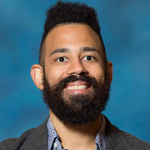Public Humanities Faculty Fellowships are awarded to scholars to support their development of public-facing Humanities research projects among an interdisciplinary community of scholars. Fellows receive a course-release to work on an individual humanities-oriented research project. Congratulations to this year’s awardees.
Tara Mulder (Ancient Mediterranean and Near Eastern Studies)
“Midwifery and Childbirth in Ancient Rome and Today”
 The proposed project is a series of popular articles on childbirth in ancient Rome and today, timed to accompany the publication of an academic trade book on the same topic. The book focuses on the second century CE, a key historical moment when for the first time we can see medical men encroaching on childbirth, the traditional domain of female midwives. The popular articles will examine connections between gynecology, midwifery, and childbirth in the ancient and modern worlds: 1) determining the “gender” of the fetus prior to birth; 2) ancient and modern tools of obstetrics and gynecology; 3) the history of Greco-Roman gynecology in North Africa and the Islamicate world.
The proposed project is a series of popular articles on childbirth in ancient Rome and today, timed to accompany the publication of an academic trade book on the same topic. The book focuses on the second century CE, a key historical moment when for the first time we can see medical men encroaching on childbirth, the traditional domain of female midwives. The popular articles will examine connections between gynecology, midwifery, and childbirth in the ancient and modern worlds: 1) determining the “gender” of the fetus prior to birth; 2) ancient and modern tools of obstetrics and gynecology; 3) the history of Greco-Roman gynecology in North Africa and the Islamicate world.
Louis M. Maraj (School of Journalism, Writing and Media)
“Say Mi Haffi Work”
 “Say Mi Haffi Work” explores the linguistic dexterity of Anglo-Creole Caribbean expressions about labour. It interconnectedly presents/reads archival material on Transatlantic slavery and East Indian indentureship in the Caribbean, autoethnographic stories on migrant Caribbean labour in the Global North, and, primarily, music lyrics/videos about “work” or “wuk.” Addressing misunderstandings about Caribbean language and labour and their appropriations through genre-bending public exhibitions/conversations on such Black(ened) “wuk,” it asks: in what ways do Caribbean rhetorics stretch “work” beyond normed, extraction-based settler-colonial logics?
“Say Mi Haffi Work” explores the linguistic dexterity of Anglo-Creole Caribbean expressions about labour. It interconnectedly presents/reads archival material on Transatlantic slavery and East Indian indentureship in the Caribbean, autoethnographic stories on migrant Caribbean labour in the Global North, and, primarily, music lyrics/videos about “work” or “wuk.” Addressing misunderstandings about Caribbean language and labour and their appropriations through genre-bending public exhibitions/conversations on such Black(ened) “wuk,” it asks: in what ways do Caribbean rhetorics stretch “work” beyond normed, extraction-based settler-colonial logics?
Kelly McCormick (History)
“Behind the Camera: Gender, Power, and Politics in the History of Japanese Photography”
 I am co-director of “Behind the Camera: Gender, Power, and Politics in the History of Japanese Photography,” an open-source digital humanities website and pedagogical tool that creates new critical directions on the history of photography, feminist art history, and the history of modern Japan. The bilingual English-Japanese website features Open Education Resource (OER) videos by international experts each accompanied by a digitized archive of related photographs, an annotated bibliography, and an interactive timeline that tracks women photographer’s activities in relation to Japanese history and the global history of photography.
I am co-director of “Behind the Camera: Gender, Power, and Politics in the History of Japanese Photography,” an open-source digital humanities website and pedagogical tool that creates new critical directions on the history of photography, feminist art history, and the history of modern Japan. The bilingual English-Japanese website features Open Education Resource (OER) videos by international experts each accompanied by a digitized archive of related photographs, an annotated bibliography, and an interactive timeline that tracks women photographer’s activities in relation to Japanese history and the global history of photography.
Benjamin Bryce (History)
“Taking the Museum Online: The National Immigration Museum (Buenos Aires)”
 I am developing a virtual museum in collaboration with the Argentine National Immigration Museum. A team of students and I will present a series of exhibits that flesh out various aspects of the history of immigration to Argentina. Projects include blogs, walking tours, virtual exhibits, and podcasts. This project seeks to help a public institution engage with the public as COVID concerns and public health restrictions keep people out of large spaces and lessen travel. It also seeks to give a bigger space to academic research (including that done in North America) in public discussions and memorialization of the past in Argentina. By striking a balance between Spanish and English content, the project also seeks to speak to an international audience interested in learning more about one of the biggest destinations for international labour migrants between 1860 and 1960.
I am developing a virtual museum in collaboration with the Argentine National Immigration Museum. A team of students and I will present a series of exhibits that flesh out various aspects of the history of immigration to Argentina. Projects include blogs, walking tours, virtual exhibits, and podcasts. This project seeks to help a public institution engage with the public as COVID concerns and public health restrictions keep people out of large spaces and lessen travel. It also seeks to give a bigger space to academic research (including that done in North America) in public discussions and memorialization of the past in Argentina. By striking a balance between Spanish and English content, the project also seeks to speak to an international audience interested in learning more about one of the biggest destinations for international labour migrants between 1860 and 1960.